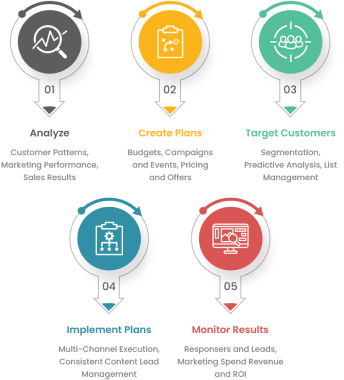
At e.Soft Technologies, we craft an integrated digital marketing strategy that aligns with your business goals by placing your intended audience in the spotlight. Through research and in-depth analysis, we will create a marketing campaign spanning multiple platforms, all dedicated to enhancing your brand’s worth and consequently delivering exceptional outcomes.

Direct email marketing has become standard practice for businesses worldwide, and is not just for the big brands with big budgets anymore. When given the context of sales moving heavily online, you can see that email marketing is in fact one of the best marketing techniques that small and mid-sized businesses can leverage to expand their business scope. Let’s look at some basic ways in which you can make use of email marketing to scale up your business
1.Develop A Strong Connection with Your Customers
Most new businesses struggle because of their one dimensional approach to their brand. For them, business is limited within the confines of transactions. However, email marketing for small businesses can help break barriers and create a deep connection with your customers.
With the increased pace and impersonal nature of the internet, a simple gesture such as sending out an email to your customer about how much you appreciate them doing business with you can do wonders. You can notify them about your new product launches and big events as well. Using email marketing is not just limited to email lead generation. It is a highly effective tool that helps you elevate your brand image.
2. Create a Unique Brand
In order to stand apart from your competition you must establish your own space within the market with your own voice and image. Some of the most successful brands have gradually become synonymous with the market in which they operate. Email marketing is a great tool that branding, and if used cleverly can develop your brand with direct access to the email inboxes of your customers.
Staying in touch with them on a regular basis with creative and fresh content helps you create a unique brand voice and image for your subscribers. First, you will want to craft a brand image for your company. A concise and well-planned guide can help you in the longer run. Each email sent is an opportunity to connect with your customers and build your brand image by utilizing email marketing services to its full potential.
3. Voice your emails with expert content
As a small and mid-sized business, you want to be seen as a local expert in the area of your business. You can concrete this image in the eyes of your customers by positioning yourself as an expert with the help of the content you present. While many have traditionally reserved email marketing for delivering coupons, sale information, or notifying product launches, it can be so much more.
Direct email marketing can there drive traffic to your business and convey relevant information that your subscribers will enjoy reading. One step forward is using blogs and videos as a part of your email campaign that will add to the market value of your outreach. This will help craft a good reputation and also show customers that you are on the forefront of digital technology. Over a period of time, people will look forward to receiving emails from you.
4. Establish Brand Credibility
The biggest obstacle small and mid-sized businesses face is building credibility. You can use email marketing to build up brand credibility by staying in touch with your customers and notify them about your business updates. The more they get to learn and hear about your business the more trust they will develop towards your brand.
You can start by thinking outside of the box when reaching out to your customers. Be creative in your approach and break the barriers of traditional marketing ideas. Email marketing is a powerful tool and with some of the approaches mentioned we can help you expand your reach into the marketplace. With each mail you are defining your brand identity. So, be mindful, clever, and creative with your email marketing campaigns.


Our comprehensive and scalable solutions include:
Explore the variety of digital marketing services provided by e.Soft:

Collaborating with you, we aim to craft an integrated digital marketing strategy that alligns with your business goals. Through research and in-depth analysis, we create a marketing campaigns spanning multiple platforms, all dedicated to enhancing your brand’s worth and consequently delivering exceptional outcomes.